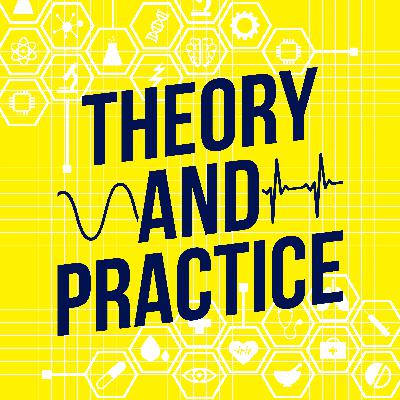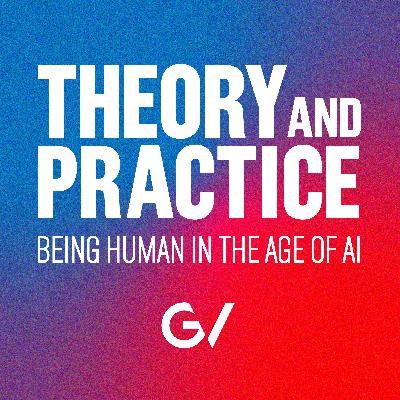Discover Theory and Practice
Theory and Practice

Theory and Practice
Author: GV (Google Ventures)
Subscribed: 101Played: 1,265Subscribe
Share
© 2023 GV
Description
Season 4 will explore one of humanity's most rapidly advancing and impactful changes: what does it mean to be human in the age of AI when computers and robots are accomplishing more human functions? How will AI with human-level skills influence us and enhance the world around us? How will we change AI, and how will it change us?
Theory and Practice opens the doors to the cutting edge of biology and computer science through conversations with leaders in the field. The podcast is hosted by Anthony Philippakis (a cardiologist, genomicist, and Venture Partner at GV) and Alex Wiltschko (neuroscientist, AI researcher, CEO of Osmo, and Entrepreneur in Residence at GV).
37 Episodes
Reverse
Theory and Practice explores the cutting edge of biology and computer science through conversations with leaders in the field. This week, your hosts Alex and Anthony introduce themselves and discuss the origins of the show.
In this episode, Princeton University’s Barbara Englehardt reveals what she’s working on in epigenetics and exploratory data analysis, and examines the theoretical foundations for machine learning and how they are applied in practice. Barbara is currently on leave from Princeton University and is a principal scientist at Genomics Plc.
Jessica Mega, Chief Medical Officer at Verily, discusses her career path, the intersection of data science and healthcare, and how medical tools can augment positive health outcomes.
Former Google CEO Eric Schmidt talks about the foundations of computer science, reflects on the role of data in healthcare, and discusses his views on the intersection of technology and life sciences as the next frontier.
In this episode, Sir Peter Donnelly, CEO of Genomics Plc and Professor of Statistical Science at the University of Oxford, explores the relationship between genetic variation and complex human diseases and talks about his career at the intersection of statistics and genetics.
Greg Corrado, senior research scientist with Google AI, examines the impact of artificial intelligence and machine learning on medicine and delves into the future of biological neuroscience.
Eric Lander, president and founding director of the Broad Institute of MIT and Harvard, joins the show to discuss human genetics and computational biology.
David Sontag, Associate Professor of Electrical Engineering and Computer Science at MIT, explores how artificial intelligence can transform medicine, and discusses the importance of fairness in machine learning.Episode notes on research attribution: Steven Horng Yoni Halpern Rahul Krishnan Fredrik JohanssonUri ShalitIrene Chen
Professor Daphne Koller is the CEO and founder of insitro. She joins the podcast to discuss how machine learning and biology can advance drug discovery and patient care.
Cori Bargmann is the head of science at the Chan Zuckerberg Initiative. She is also the head of the Lulu and Anthony Wang Laboratory of Neural Circuits and Behavior and the Torsten N. Wiesel Professor at The Rockefeller University in New York. She joins the podcast to discuss advancing science on a larger scale.
Zach Weinberg is the co-founder, president, and COO of Flatiron Health. He discusses his entrepreneurial journey and Flatiron Health's approach to accelerating cancer care and improving patient outcomes.
The hosts interview a panel of distinguished guests, including life sciences entrepreneur and investor Alexis Borisy, Finale Doshi-Velez of Harvard University's John A. Paulson School of Engineering and Applied Sciences, and Pardis Sabeti of the Broad Institute of MIT and Harvard.
On this season of Theory and Practice we explore one of the art of being a great biologist – marrying a problem to a solution, choosing the right biological question, and pairing it with the right technology.Dr. Anne Carpenter is the inventor of CellProfiler and designed a method for coloring and analyzing cells. She works at the Broad Institute as the Senior Director of the Imaging Platform and is an Institute Scientist.One of the things that strikes me about Anne's work is how visionary it is. She started doing this a decade ago or more, at a time when computer vision was not nearly as mature as it is today. The idea that you could just image cells and extract biologically meaningful information from them was not at all obvious when she first started.Theory and Practice is a presentation of GV and Google AI.Hosted by Anthony Philippakis (Venture Partner at GV) and Alex Wiltschko (Staff Research Scientist with Google AI), Theory and Practice opens the doors to the cutting edge of biology and computer science through conversations with leaders in the field.
We speak with Professor Sir Rory Collins, Head of Nuffield Department of Population Health at Oxford University and BHF (British Heart Foundation) Professor of Medicine and Epidemiology. Professor Collins is also Principal Investigator and Chief Executive of the UK Biobank.Theory and Practice is a presentation of GV and Google AI.Hosted by Anthony Philippakis (Venture Partner at GV) and Alex Wiltschko (Staff Research Scientist with Google AI), Theory and Practice opens the doors to the cutting edge of biology and computer science through conversations with leaders in the field.
This week on Theory and Practice, we speak with Jennifer Listgarten, a professor in UC Berkeley's Electrical Engineering and Computer Sciences department and the Center for Computational Biology. Before Jennifer joined UC Berkeley she spent ten years at Microsoft, working in the New England Research Lab.Theory and Practice is a presentation of GV and Google AI.Hosted by Anthony Philippakis (Venture Partner at GV) and Alex Wiltschko (Staff Research Scientist with Google AI), Theory and Practice opens the doors to the cutting edge of biology and computer science through conversations with leaders in the field.
Theory and Practice speaks with Dr. Caroline Uhler, currently the Henry L. and Grace Doherty associate professor in EECS (Electrical Engineering & Computer Science) and IDSS (Institute for Data, Systems and Society) at MIT, and associate member of the Broad Institute where she is co-director of the Eric and Wendy Schmidt Center.Theory and Practice is a presentation of GV and Google AI.Hosted by Anthony Philippakis (Venture Partner at GV) and Alex Wiltschko (Staff Research Scientist with Google AI), Theory and Practice opens the doors to the cutting edge of biology and computer science through conversations with leaders in the field.
Krishna Yeshwant is Managing Partner at GV, and a practicing physician at Brigham and Women’s Hospital in Boston. Krishna embodies this mix of being both an intellectual and a business person. Most of his investments are at the intersection of life sciences and data sciences, like Flatiron Health, Foundation Medicine, EQRx, and Imagen. He's interested in finding companies at that interface. You'll hear him talk about starting his first company, making the mistake of hiring his friends, and the bumps and bruises of learning.Theory and Practice is a presentation of GV and Google AI.Hosted by Anthony Philippakis (Venture Partner at GV) and Alex Wiltschko (Staff Research Scientist with Google AI), Theory and Practice opens the doors to the cutting edge of biology and computer science through conversations with leaders in the field.
Every so often, someone comes up with a new idea that is truly visionary. The first time you see it, you may not immediately appreciate how transformational it might become.As an attending physician in Boston Children's Hospital's Division of Genetics and Genomics, Tim was caring for a young patient with a devastating genetic mutation. He suspected her condition could be treated with an adaptation of an existing class of therapies, and he also knew that she was likely the only person in the world who would benefit from that drug. Instead of accepting the conventional wisdom that N of 1 means you don't have a valid experiment, Tim asked himself a bold question: "Why not try to give her the therapy?"Tim went to the FDA, created a toxicology package, got it approved, manufactured it, and created a lifetime supply for his patient.Theory and Practice is a presentation of GV and Google AI.Hosted by Anthony Philippakis (Venture Partner at GV) and Alex Wiltschko (Staff Research Scientist with Google AI), Theory and Practice opens the doors to the cutting edge of biology and computer science through conversations with leaders in the field.
David Altshuler is Executive Vice President, Global Research and Chief Scientific Officer at Vertex Pharmaceuticals.I first met David when I was a medical student, and I spent my last year of my MD-PhD working in his lab at Massachusetts General Hospital. At the time, a new type of DNA sequencer (Solexa, soon to be acquired by Illumina) had just arrived at the Broad, and I raised my hand to be one of the people in his lab to get it up and running.At the time, most of David's lab was working on genome-wide association studies (GWASs), but David believed that sequencing was the next horizon. This gave me the opportunity to work with him closely, and figure out how next-generation sequencing could impact human genetics.Theory and Practice is a presentation of GV and Google AI.Hosted by Anthony Philippakis (Venture Partner at GV) and Alex Wiltschko (Staff Research Scientist with Google AI), Theory and Practice opens the doors to the cutting edge of biology and computer science through conversations with leaders in the field.
Physicians make very big decisions in people's lives. Whether or not to put in a heart valve, whether to do a stent or surgery, what chemotherapy to dose. We often make these big decisions with very little data for decision support. This has to change. As we discuss in this episode, the future of medicine will involve advanced machine learning to improve clinical decision making, and better ways to match patients to personalized therapies.Dr. Amy Abernethy is an oncologist, specialist in palliative care medicine, researcher, previous Professor of Medicine at Duke University School of Medicine, previous Scientific and Medical Chief Officer of Flatiron Health, and previous Principal Deputy Commissioner of the FDA.Theory and Practice is a presentation of GV and Google AI.Hosted by Anthony Philippakis (Venture Partner at GV) and Alex Wiltschko (Staff Research Scientist with Google AI), Theory and Practice opens the doors to the cutting edge of biology and computer science through conversations with leaders in the field.






